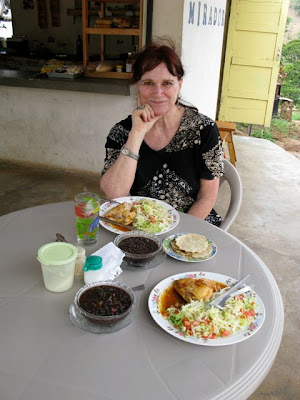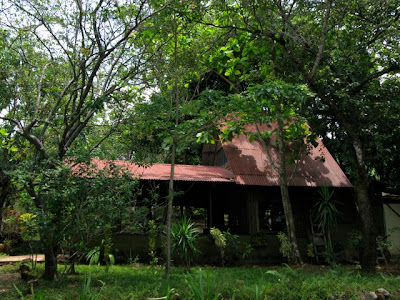



I wake a little before 6:00 A.M. light streaming through our second floor window and unseen birds harmonizing shrilly with the sound of traffic. Tabra is already up and steps out to check her e-mail in a nearby computer nook. Our room is extremely simple; two twin beds with paper thin mattresses, hard pillows, a table and single chair. A simplistic mural of jungle vines curl up one of the walls and a bucolic scene of a peasant house surrounded by trees decorates the opposite wall. A frame is nailed into the plaster wall, framing two sides of the mural, intent of giving it the illusion of a painting, but the other two sides of the frame are missing. Breakfast is downstairs in a covered and slightly crumbling courtyard, decorated with more murals. Over strong coffee, fresh sweet papaya, pineapple and melon, we arrange our schedule for the week.
Our plan is to go to Turrubares, where Tabra has recently bought property and owns a cabin in the jungle. She calls her caretaker to make certain the he will hook up the electricity and I telephone Tortuguero to change our reservations. We will rent a car and drive the two hours to Turrubares, but with an hour to spare before our rental car is brought to the Hemmingway Hotel, we walk two blocks to see the Jade Museum. It’s an exceptional museum filled with pre-Colombian carved jade, pottery and jewelry and we both wish that we had more time to digest the exhibits..
We take out the full insurance for the rental car and with Tabra behind the wheel, cautiously proceed out of San Jose. We share a few inhalations of breath as she maneuvers the city traffic, but soon we are in the countryside, the narrow road winding steadily upward. We pass brightly painted country houses, their gardens lush with tropical foliage. The delineating fences are constructed of growing saplings, strung together by barbed wire and livestock struggles to keep a foothold on the rising terrain. We stop for lunch at an open air, road side restaurant with a breathtaking view of mountains and valleys muted by a slight haze. We are the only guests and a cheerful, plump, young woman recites the limited menu. The chicken plate with spicy black beans, slabs of white cheese, tortillas and salad is delicious. We have not asked the price in advance, but the bill is just $9.00 for the two of us. We proceed onward and upward for another hour and eventually come to the locked gate leading to Tabra’s cabin.
Tabra hands me a clump of keys and I struggle to remove the padlock and separate the gate so that we can drive in. A graded dirt road, several hundred yards long, stretches beyond. A painted sign, The Garden of Eden, hangs above the entrance to her cabin. I have held a vision of the “cabin” in my mind for over a year, and the screened in porch, gated and locked with an interior kitchen and loft, is not what I expected. A rectangular swimming pool is parallel to the cabin, shimmering an inviting turquoise in the humid afternoon. The jungle is lush beyond the swimming pool and the Turrabales Mountains are hazy in the distance. We enter the cabin and with a few quick switches, realize that we have no electricity. As I am wrapping my mind around this, a dilapidated van pulls up outside and Louis, Maribel and their son Esteban arrive. Esteban is 7 or 8 years old and stares wide eyed at the two American women. We hold our breath as Louis adeptly unscrews fuse boxes and twists wires. His wife sweeps away insect debris and arranges fresh mangos on a plate. Within 30 minutes, electricity is a reality and I look forward to the afternoon and evening ahead. In the heat of the afternoon, the pool beckons and after they depart we change into swim suits and swim. I skim the unfortunate insects off the surface of the pool, just slightly cooler than air temperature and gravity fed by the river. As evening descends we take a walk around the property surrounding the house; the shrill crescendo of cicadas is deafening and eerie.
We drive to San Pedro, for a dinner of chicken, beans and salad, a repeat of today’s lunch. The village is small and the screened in restaurant is the local night spot. Eight or ten people sit at the formica bar, drinking beers and coca colas. We sit at a plastic table, in plastic patio chairs and are the only dinner guests. A police man stands outside in the road, behind the few parked cars and Tabra explains that there is a new law in Costa Rica, forbidding anyone to drive after three beers. I watch the beers pile up on one table beyond and wonder if the lone police man is counting, watching and waiting. We drink only water and return the few miles to Tabra’s property. We are relieved that the electricity is still working and settle in for the night, locking both the screen gate to the patio as well as to the kitchen area and upstairs sleeping room. Tabra shutters the windows and we sit talking for sometime in the cold blue light of florescent bulbs. I startle when I hear a low growl outside the locked kitchen door, to the right of my chair. Tabra tells me that she isn’t worried about the animals, nor am I. Our only concern would be the two legged kind. On two occasions, Tabra installed electricity to her cabin, once above ground and then below ground. On both occasions the wires were stolen for their copper value. The electricity for this stay has been provided by a rolled up wire that stretches the 200 yards down from the road to her cabin. When we leave, the caretakers will roll it back up and store it until she visits again.
Tabra gives me a signed copy of The Sum of our Days, by Isabel Allende. Isabel is Tabra’s good friend and Tabra is often a character in her books. We climb the ladder to the sleeping loft and read before turning out the lights.
